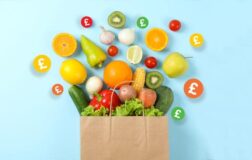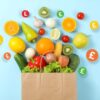20 student kitchen cupboard essentials
Keen to try out new recipes but feel like you're always missing the key ingredients? Stock up on these food essentials and your meals will pretty much cook themselves (well, almost).
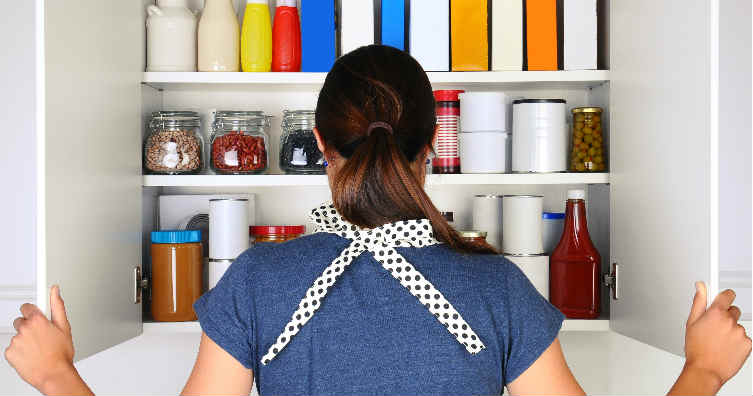
Credit: Steve Kukrov – Shutterstock
When you first arrive at uni, it can be really easy to get into the habit of continually reaching for the takeaway menu – especially if you've never really cooked before.
Hold tight though! While you can get cheaper takeaways, it's still much lower cost (and healthier) to cook meals from scratch at home.
Investing in just a few cupboard essentials at the start of the year will make rustling something up much easier and cheaper in the long run. So, if you're preparing your student shopping list, read on for the best foods to take to uni.
Top 20 food essentials for the kitchen
Make sure you have these things in your kitchen cupboard:
-
Salt and pepper
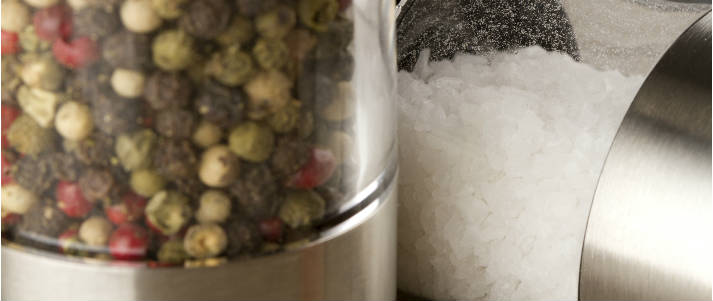
Credit: Light Bulb Studio – Shutterstock
These are two of the most obvious cupboard essentials, but we can't go without mentioning them since they're basically the underrated heroes of cooking.
Although we'd recommend you reel in your salt intake (it's not great for your health), mastering the art of seasoning will turn even the dullest of dishes into an absolute delight.
We'd suggest investing in proper salt and black pepper grinds to increase taste levels. White pepper and table salt still do the job, but you'll thank us later.
-
Tabasco
Tabasco is one of the best cupboard staples you can use to spice up any meal. But just as a warning – there's a high chance that you'll get addicted to this stuff as a student.
Slowly but surely, you'll start to feel like no meal is right without Tabasco's spicy/peppery/vinegary goodness. Some people even start carrying pocket-sized bottles around with them. It's almost like they make it that size on purpose...
Tabasco can last in the cupboard for a month or two, but pop it in the fridge and it'll be good to use for months. An even cheaper alternative would be to keep some chilli powder to add to dishes instead. But bear in mind that you'll be missing out on the vinegary bonus.
-
Mixed dried herbs
Using a variety of mixed dried herbs is the secret to cooking great-tasting food cheaply.
It's all about choosing the herbs you like most. It's always a good idea to buy a seasonal mix such as Italian or Mediterranean mixed herbs. They will add so much flavour to all sorts of dishes.
If you manage to choose the 'right' herbs, pretty much any meal will taste good. It's just a matter of working out which ones suit your tastebuds.
To cut costs even further, you could even try growing your own herbs on the kitchen windowsill.
-
Cooking oil
Cooking oil is essential for the kitchen – you'll need it to cook almost any meal.
You might find that a lot of recipes will suggest using extra virgin olive oil. While this is definitely going to add to the taste and quality of your food, bog-standard olive oil will do.
Cheaper options like sunflower or vegetable oil are just as effective for cooking and frying food. Plus, it's highly unlikely that you'll notice any difference in taste from olive oil. That is, unless you have an extremely sophisticated pallet (in which case, good luck with your student diet!).
-
Pasta

When you're a pro at budgeting, pasta really is your best friend. As long as you jazz it up with different sauces and ingredients, it's hard to get tired of eating pasta.
If you're looking for a simple snack, then pasta with a little olive oil, grated cheese and some salt and pepper is the ultimate comfort food and costs about 30p to make. For the thrill-seekers amongst you, add a couple of dashes of Tabasco into the mix.
-
Rice
Rice is yet another dried cupboard essential to add to your student shopping list. It can go with almost everything. Plus, to keep your weekly meals interesting, it can be an equally cheap carbohydrate to alternate with pasta throughout the week.
If you're looking for inspiration for what to eat with your rice, we've got a great chilli con carne recipe that's sure to become one of your go-to favourites.
-
Chopped tomatoes
Unlike fresh tomatoes, a tin of chopped tomatoes will literally last for years. Use them to slap up a pasta dish, a curry sauce, or pretty much anything you fancy.
To save money on food, it's worth looking for a cheap can of chopped tomatoes on Approved Food. The site sells loads of food items that are past their best-before date, but not before their use-before date. That means that they're still perfectly edible.
And, for cooking inspiration, our recipe vault is full of ideas that use tinned tomatoes as a base, such as chilli con carne and chicken enchiladas.
When buying food, try the supermarket downshift. You could save £520 a year by switching to value-brand products. -
Tomato puree
Closely related to the last cupboard essential on this list, a tube of tomato puree will cost you around 60p and goes a long way.
Try adding a spoonful to any recipe that involves tinned tomatoes. Doing so will magically bring out the flavour of the tomatoes.
As a bonus, you can also use it as a base to make your own pizzas!
-
Flour
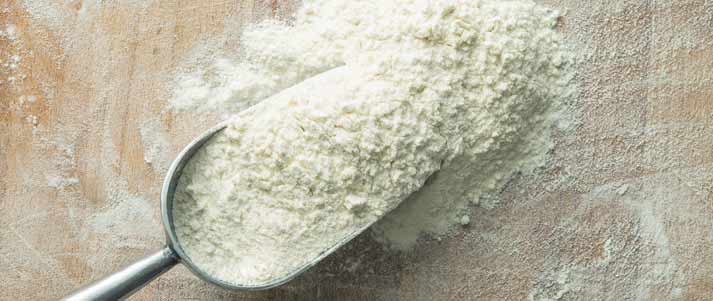
It's always a good idea to have a bag of flour in your cupboard. Not only is it great for making a riotous good mess (flour fight, anyone?), it's decent for cooking with too.
It works a treat when whipping up sauces, like this simple fail-proof cheese sauce, and is a basic necessity when baking cakes and desserts.
-
Sugar
Without sounding like Jamie Oliver, too much sugar definitely isn't good for you. Particularly as a student, sugar can really mess with your energy levels and cause you to crash hard if you overdo it.
However, there's no denying that a little bit of sugar is good for loads of recipes. This includes stir-fries, Bolognese sauce and, of course, cakes.
To keep things versatile, we'd recommend going for caster sugar over regular sugar. It's much better for cooking since it dissolves quickly.
Check out this guide to the best foods to eat while studying – stay healthy, alert and avoid those sugar crashes. -
Bread
Unless you have a gluten intolerance, bread will probably make up a large proportion of your student diet.
Sandwiches are ideal when you're on a budget. Plus, you can keep things interesting by getting creative with every sandwich you make.
We know this is technically meant to be a cupboard-only list, but it's worth knowing that bread also lasts way longer if you put it in the freezer and defrost (or simply toast) before use. That way, you won't have to worry about eating it all before it goes stale.
-
Baked beans
There's a reason why baked beans are seen as the staple cuisine of students. Whether they're on a baked potato, toast, alongside some meat and veg, part of a fry up or just by themselves, beans are the epitome of versatility.
What's more, they're cheap, tasty and also count as one of your five a day.
Want to take your beans game to the next level? We've got some baked bean recipes that use them in ways you might never have considered.
-
Potatoes
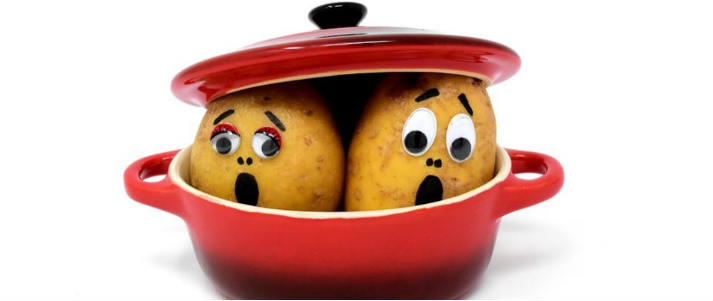
Boil them, mash them, roast them, make them into weird potato art... there are so many things to be done with potatoes. They are easily one of the best foods to keep in your student kitchen.
One great way to cook them is to simply cut them into cubes, chuck them onto a baking tray with salt, pepper and a mix of herbs and spices, drizzle on oil and cook for around 30 minutes at 180°C.
Potatoes are definitely a cupboard essential, but keep in mind that they'll start to grow sprouts if you keep them too long. Store them in a dark, dry cupboard in a paper bag and you can extend their shelf life.
-
Onions and garlic
Onions and garlic are super useful ingredients to keep in the kitchen as they're quick to prepare and add heaps of flavour to meals.
Whether you're making a simple curry or a Bolognese sauce, they're the base of pretty much everything you cook in a pot. Just chop them fast so you don't end up crying all over your kitchen.
Or, if you really loathe the process of chopping garlic, you can actually buy it pre-chopped in jars to use when you wish. It certainly doesn't taste as good as fresh garlic, but it lasts ages and saves you a stage of food prep.
If you don't fancy lugging all this food back from the supermarket, order online instead. Here's how to get the best deal on your online shop. -
Soy sauce
If you're a fan of Asian food (which we definitely are), it's worth investing in some soy sauce. Soy sauce is arguably the most common source of salt in Asian cooking, so you can use it in countless dishes.
We recommend going to a Chinese supermarket to get your soy sauce as opposed to buying it in a regular supermarket. The bottles you can buy there are around double the size and half the price!
-
Tuna
Okay, if you really don't like tuna, skip this one.
It may seem like an odd item to include as a food essential, but the nutritional value that you get in tuna for the price is incredible. Tuna is packed full of protein which is great for keeping up your energy levels and brain power.
Throw a can of it in a pasta bake, salad or sandwich for a great meal that will keep your hunger at bay.
-
Stock cubes
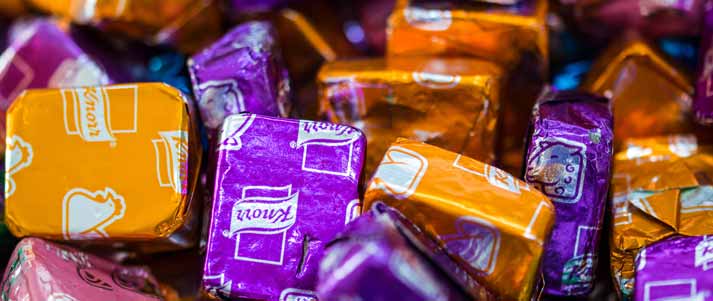
Credit: Michael Gaylard - Flickr
Stock cubes are really useful to have in your cupboard. They're an important addition to a lot of staple dishes and are needed in pretty much any pot of soup you make.
Veggie or chicken are the most versatile of all the stock cubes. We suggest going with one of those if you're buying just one flavour.
-
Soup
It's so easy to make your own soup. But if you're not up for that, there are also plenty of other cheap and cheerful options.
Tinned soups are always great to have stored in the cupboard for a rainy day, as are the seriously cheap sachets of Cup a Soup.
Cup a Soups are also great to carry around in your bag to have as a study snack. All you need to do is ask for a cup of hot water in the uni canteen (which, if the person serving you has half a heart, they won't charge you for).
Again, if you're a big lover of Asian cuisine, multipacks of miso soups at Chinese supermarkets are seriously cheap, so get stocking up.
-
Ketchup
Ketchup isn't just for fries. We're including ketchup in this list, not just as a condiment, but as an ingredient to be used in heaps of recipes that need a sweet and rich kick.
You wouldn't believe how many tomato-based curry recipes recommend a good splodge of the stuff, and spaghetti Bolognese just isn't the same without it.
-
Tea and coffee
When you're stressed out after an all-nighter in the library, at least you can fall back on the ever-comforting tea and coffee.
Keep a steady stock in your cupboard for late-night heart-to-hearts, break-ups and early-morning pick-me-ups.
This basic list of food essentials will help you get started in your new uni home. And, as the year goes on, you'll see your cupboard collection grow. It might seem a bit expensive to stock up at first, but these items will last a seriously long time and will be worth the initial investment.
If you also need to pick up some kitchen utensils, check out our list of the best kitchen gadgets for ideas.

